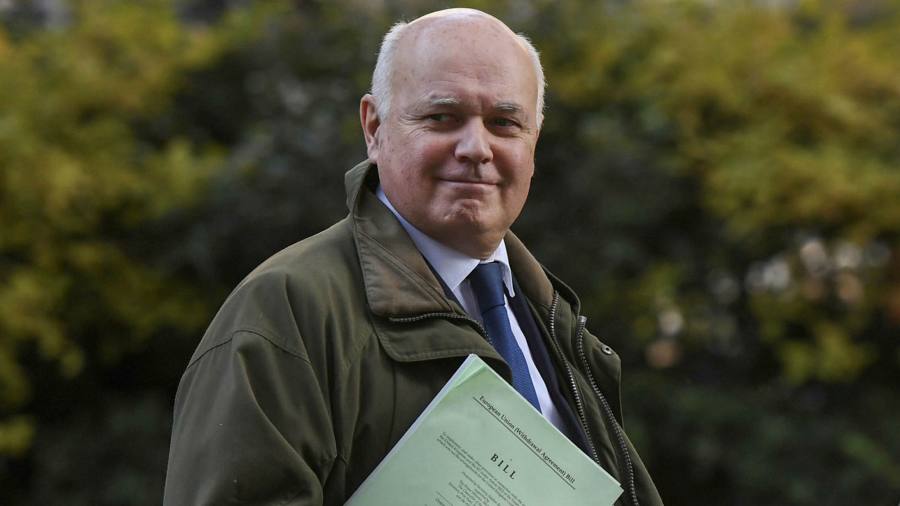[ad_1]
Boris Johnson’s adviser on regulatory reform, Iain Duncan Smith, has said he will not lead a “slash-and-burn exercise†when it comes to changing Britain’s post-Brexit rules.
Duncan Smith’s comments chime with warnings from business leaders that they do not want the UK prime minister to oversee a “bonfire†of EU red tape and instead want to see him focus on ensuring the government becomes “nimbler†at making new rules.
The idea of a post-Brexit conflagration, laying waste to what they see as stifling Brussels regulation, has been a staple of Eurosceptic discourse for years, but it is being quietly doused by the government.
Instead Johnson and his chancellor Rishi Sunak are intensifying efforts to explain exactly how they will use their post-Brexit freedoms in future, urging business leaders to help fill in the blank canvas.
Business groups report being “badgered†by Downing Street to come up with ideas for regulatory reform, while MPs led by Duncan Smith are seeking ideas to present to Johnson by May.
One business leader said: “We don’t want a bonfire of regulations. If they want to cut red tape, they should start with the new burdens exporters are facing at the borders after Brexit.â€
Duncan Smith, chair of Johnson’s innovation, growth and regulatory reform task force, said his group would be proposing “fast and sensible†regulatory reforms, drawing on English common law principles.
“You need people to take responsibility — we intervene when necessary,†the former Conservative leader told the Financial Times. His group was looking to future regulation, rather than a “slash-and-burn†approach to what was already on the statute book.
The idea of ripping up existing EU rules is largely unpopular with companies — which have already incorporated them into their business models — and is potentially politically toxic.
Kwasi Kwarteng, new business secretary, ordered his staff to stop reviewing EU rules on working time after the Financial Times revealed that the exercise was under way. “The review is no longer happening,†he said.
Ed Miliband, shadow business secretary, said: “Businesses are not crying out for worse workers’ rights, lowered environmental protections or the erosion of standards. The red tape they are most concerned about is the new bureaucracy at the border.â€
The Conservative manifesto rules out any lowering of standards in areas like workers’ rights, climate change, food safety or animal welfare. Any changes in these areas could also trigger trade retaliation by the EU.
One former Tory cabinet minister involved in previous attempts to root out red tape said: “You cast around and find virtually nothing anyone wants to repeal. Then you find there was a reason it was put there in the first place.â€
Johnson and Sunak, chair of a “better regulation†cabinet committee, are instead focusing on a new approach where Britain sets a more “agile†framework to allow high-growth sectors to flourish.
The prime minister has previously identified areas such as driverless cars, artificial intelligence, fintech, and bioscience as those which could benefit from regulations set quickly at national level, bypassing EU bureaucracy.
Sunak has set up a number of regulatory reviews to shore up the City of London’s global appeal.
The Kalifa and Hill reviews of fintech and listings are examining lower free float requirements and whether to allow dual-class share structures on the premium segment of the main exchange to attract entrepreneurs who want to keep control of their businesses.
A review of the Solvency II insurance regime will ease capital requirements, with the aim of releasing more money for investment in expanding new sectors of the economy.
Sunak has seized upon the success of Britain’s Covid-19 vaccine programme as a template for the kind of new economy he wants to build.
“I think our regulatory system has proved to be more agile and nimble and much better joined-up than others perhaps around the world,†Sunak told an online jobs forum this month, referring to the development of the Oxford/AstraZeneca vaccine.
If it had remained an EU member, there was nothing to stop the UK from developing its own vaccine programme or issuing speedy domestic authorisation for its use.
But ministers argue that Brexit fundamentally changed mindsets at Westminster, and Johnson’s allies speak increasingly of “self-sufficiency†in key industrial sectors, with the state playing an active role.
The UK government backed promising homegrown vaccine candidates to the tune of £84m. Oxford/AstraZeneca also received help in kind as work was done to refine the manufacturing process for their vaccine and then to produce it at large volume.
The vaccine was approved for use by the UK’s medicines regulator on December 30, a month before it was approved for use by its EU equivalent.
George Freeman, a former science minister who is working with Duncan Smith on the regulatory task force, said: “To unlock serious growth in new sectors of the economy we need to replace the EU ‘precautionary principle’ with a pro-innovation framework for regulation.â€
He cites using new technology to regulate products such as e-scooters and drones, although he said Brexit could also deliver “huge opportunities,†for example allowing farmer’s to plant a blight-resistant potato banned by the EU.
[ad_2]
Source link





